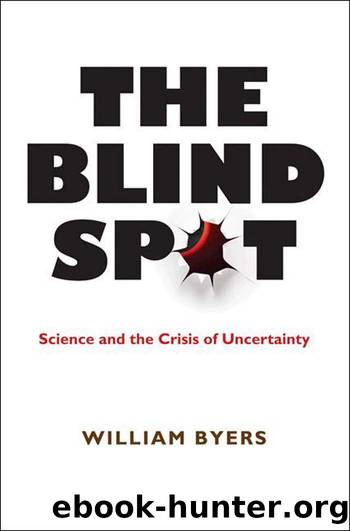The Blind Spot by Byers William;

Author:Byers, William;
Language: eng
Format: epub
Publisher: Princeton University Press
It looks like a particle whenever we look. In between, it acts like a wave. Because [a] measured electron is radically different from [an] unmeasured electron, it appears that we cannot describe [the electron] as it is without referring to the act of observation.10
The problem here is what is called “the collapse of the wave function.” This is the claim that the state of a subatomic particle such as an electron consists of a probability wave consisting of all possible states until an act of observation triggers the “collapse” of this wave and the emergence of one definite state. This is not a question of lack of knowledge since one cannot, in principle, determine which state the particle will assume. Before the act of observation, it is not even reasonable to make the statement that the particle is in a specific state. It is the act of observation that triggers this “collapse.” The scientist is therefore not outside the experiment. She is on the inside affecting the outcome by her act of observation. So in this sense you could say that quantum mechanics is a participatory theory. Questions of meaning, the “why” that Feynman refers to, can best be addressed at this level.
If the ambiguous situation I have just described is brought to the fore most strongly in the social sciences, and it also exists in particle physics, there nevertheless remains an element of it in all of science. The reason for this is because the participant/observer split is fundamental to the human condition itself, and so inevitably the scientist carries this split into her scientific work. The very claim that science is objectively true is itself a response to this ambiguity. Therefore, there can be no philosophy of science that does not take this condition into account. All scientific experimental situations have this element of observer/participant ambiguity. Acknowledging one’s role as participant and observer precipitates an infinite cascade. Each of lines 1, 2, 3, … (on page 99) refers to a mode of consciousness of the scientist. Normally, the scientist works from (what he imagines to be) a single mode of consciousness (observer). It gives a unique perspective (point of view) from which to understand and communicate science. To admit his role as participant threatens to destabilize the entire scientific process. Yet this is the reality of the situation.
In his famous book, The Structure of Scientific Revolutions, which I referred to in chapter 4, Thomas Kuhn compared “normal” with “revolutionary” science.11 My distinction between classical and self-referential science is certainly not the same as his, but it is interesting to compare them. Kuhn’s “normal” science takes place within a well-established paradigm. In such a situation, the status of the observer is not usually a problem. So most normal science, especially the examples discussed by Kuhn, would be classical. Kuhn’s revolutionary science occurs when a paradigm is found to be deficient and there arises a competition between alternative paradigms. At such a time, the participant status of the scientist is certainly relevant.
Download
This site does not store any files on its server. We only index and link to content provided by other sites. Please contact the content providers to delete copyright contents if any and email us, we'll remove relevant links or contents immediately.
Enlightenment Now: The Case for Reason, Science, Humanism, and Progress by Steven Pinker(6854)
A Journey Through Charms and Defence Against the Dark Arts (Harry Potter: A Journey Through…) by Pottermore Publishing(4713)
A Journey Through Divination and Astronomy by Publishing Pottermore(4239)
The Immortal Life of Henrietta Lacks by Rebecca Skloot(4233)
Elon Musk by Ashlee Vance(3841)
Origin Story: A Big History of Everything by David Christian(3459)
COSMOS by Carl Sagan(3325)
Alchemy and Alchemists by C. J. S. Thompson(3281)
Enlightenment Now by Steven Pinker(3259)
Shadow of Night by Deborah Harkness(3161)
Inferior by Angela Saini(3138)
A Mind For Numbers: How to Excel at Math and Science (Even If You Flunked Algebra) by Barbara Oakley(3092)
Bad Pharma by Ben Goldacre(3075)
Origin Story by David Christian(2974)
Signature in the Cell: DNA and the Evidence for Intelligent Design by Stephen C. Meyer(2868)
The Code Book by Simon Singh(2837)
The Elements by Theodore Gray(2834)
A Brief History of Time by Stephen Hawking(2806)
A Journey Through Potions and Herbology (A Journey Through…) by Pottermore Publishing(2762)
